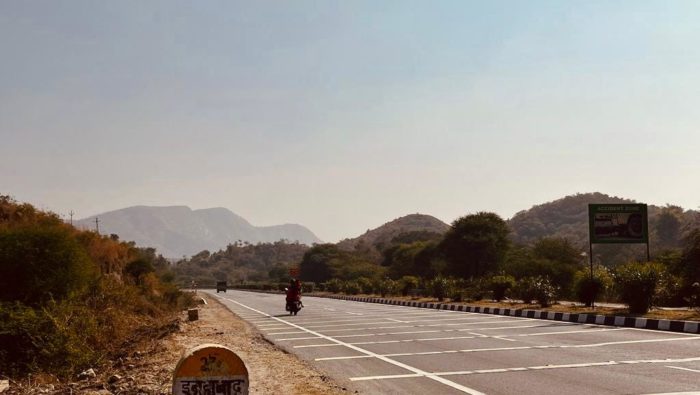
On Learning to Drive

The first thing I complained about during fieldwork in India was the heat. And it was the thing I was most ashamed of feeling unable to cope with. At first, I asked around for tips and tricks: drink chaanch, everyone advised, the spiced buttermilk that cools the body down in the summer. Sattu, roasted gramflour, mixed in with water and carried in a thermos. Cover your head with a dupatta. Lots of water. But the most enduring advice: avoid going outside if you can help it.
This was not easy advice to follow as an ethnographer freshly out in the field, with a million questions on my mind and the fear of ticking time. Growing up in the temperate climes of Bangalore in the south, I was entirely unused to summers of this intensity and length. I was hoping to understand how communities affected by occupational disease in Rajasthan engaged with the law to make claims upon the state. I wanted to be attentive and engaged, and yet my body was far too aware of its corporeality: the heat, the stickiness, the exhaustion. Early on in my fieldwork, after a May Day march out in the sun, I remember a union member telling me passionately about their life story, how they came to join the union’s work, what they thought of the day’s demonstration. Knowing how important the conversation was, I nodded and tried to ask questions, but my brain felt like a plate of scrambled eggs, dazed and bewildered.
Heat, and its discomfort, is a hard thing to describe when you’re not in it. It was the hottest summer in Rajasthan on record that year and the highs were nearly at 50°C. I found it challenging to travel from the city to my intended field-site: at first, I tried to take the bus, but the crowded and hot conditions meant that I had wilted by the time I arrived two hours later. And when I returned in the evening, I was incapable of writing any fieldnotes. I was forced to improvise my entire research design around it, as I didn’t have housing at my field-site yet. I ended up observing doctor-patient interactions at a health clinic instead, as an ambulance reliably made the journey there twice a week. I learned a great deal that I didn’t expect to, but I couldn’t shake the feeling that I wasn’t getting at an understanding of everyday life just yet.
I’d never had an interest in cars or driving before, nor was I particularly excited about learning. But my parents had generously offered me my mother’s old car, knowing that the heat and lack of mobility was challenging. I thought it might prove a good solution to my problems with the bus, heat, and fatigue. I was all too aware, of course, that by burning all that fossil fuel I would only be exacerbating the climate crisis causing the heatwave in the first place. Besides, I worried about how people would perceive me. Many of the people I worked with owned or borrowed motorcycles to get around. Would it draw further attention to the class and caste differences between us? Would my interlocutors think I was a spoiled brat, unable to cope with the bus and the heat? Which, in a way, might be true. Or was I simply unaccustomed to the searing summer heat in which I now had to work?
But I knew I needed to spend more time in my field-site where the union activists were. So, I signed up to lessons, and practiced navigating the roads in Rajasthan. I learned the culture of the road: who not to pick fights with, how to honk as a form of greeting, and that the road was a place where my intransigence was rewarded, not punished. Over time, driving to the field became the highlight of my week, offering me moments of solitude and a chance to pause and process my experiences.
The car also afforded unexpected opportunities for connection. After my colleagues judged that I was a passable driver, I was invited on a range of excursions, asked to ferry materials, and to arrange family reunions. My new friends liked riding in the car, particularly with the air-conditioning on, and would fill me in on the significance of the sites we drove past. Here, that’s where the old factory was… that’s the cement plant, the one where a big strike happened… that’s where the cinema used to be… that’s where a silicosis patient used to live, he died last winter… we surveyed this area last year… I came to have a better understanding of the place I was in and the people I was with: the histories that mattered to people, what was passed on. And it was the site of jokes, too, fostering a more convivial relationship: my singing and choice of music, how I’d insist everyone put on their seatbelt.
In the process, I also came to have a better understanding of who I was as a fieldworker. I had to make imperfect choices and wrestle with their implications. In longer-term participant observation, your body is the research instrument: and so I had to drive decisions not only about the direction of the research, but also about when I needed to refuel with rest, food, cooler air, and privacy. Through this, I learned that fieldwork was sometimes about the relationship between driving and being driven: knowing when to take a backseat and when to steer, and how to think of myself as a full human (not just a researcher) while navigating fieldwork.

